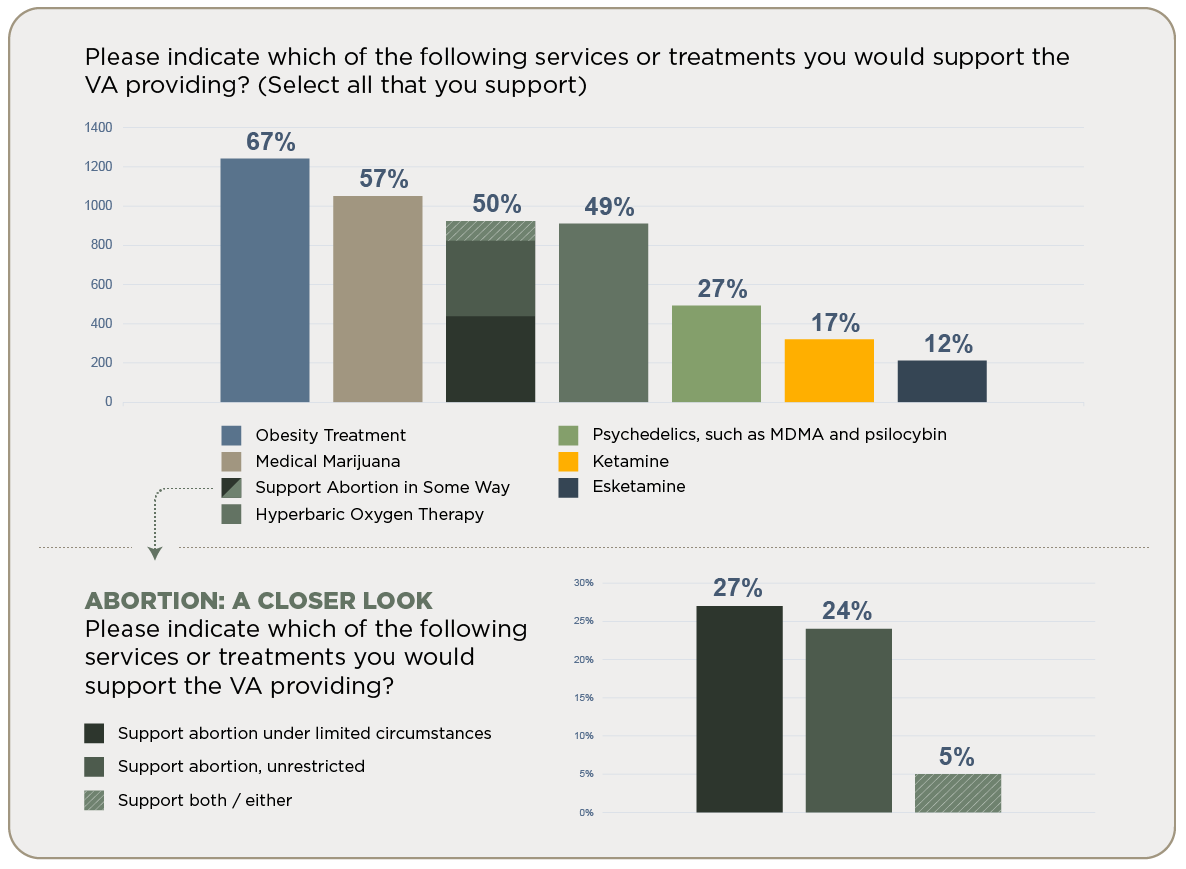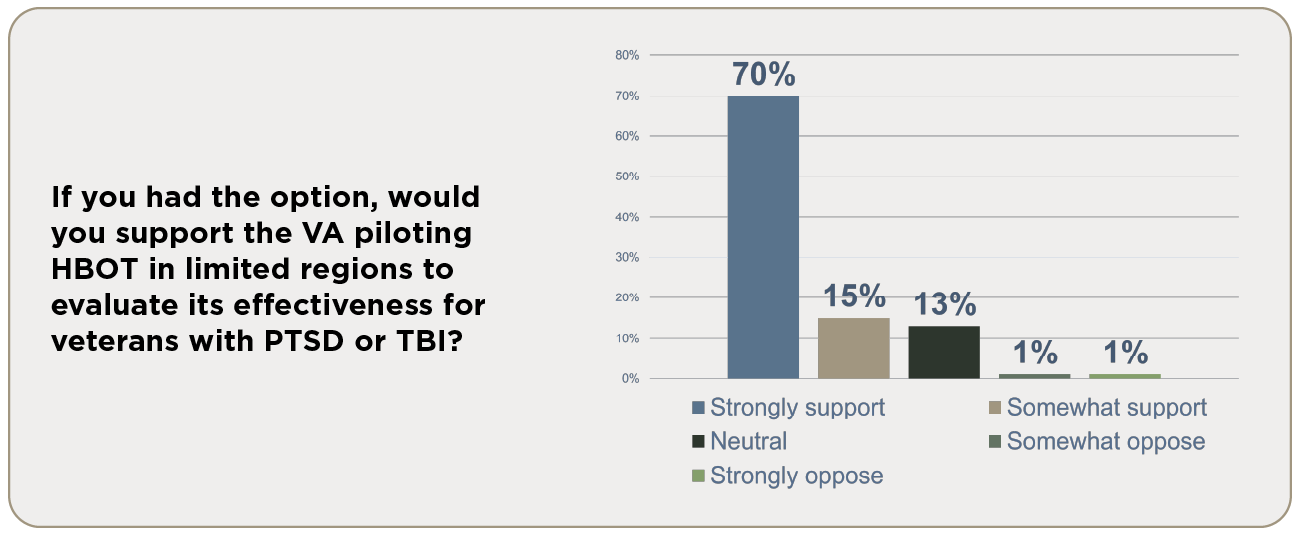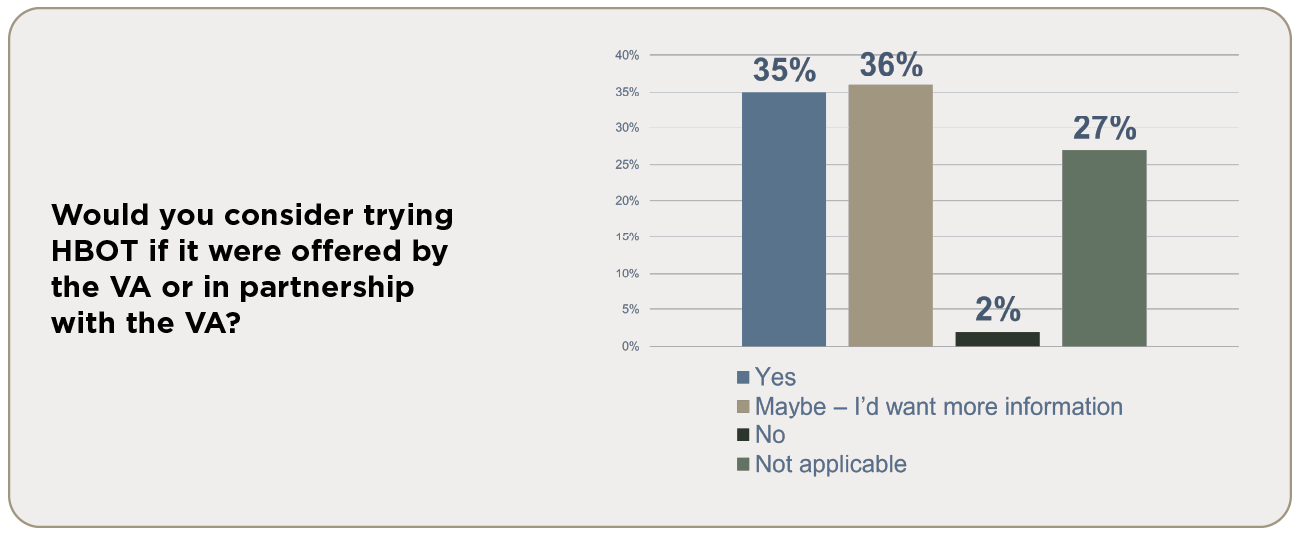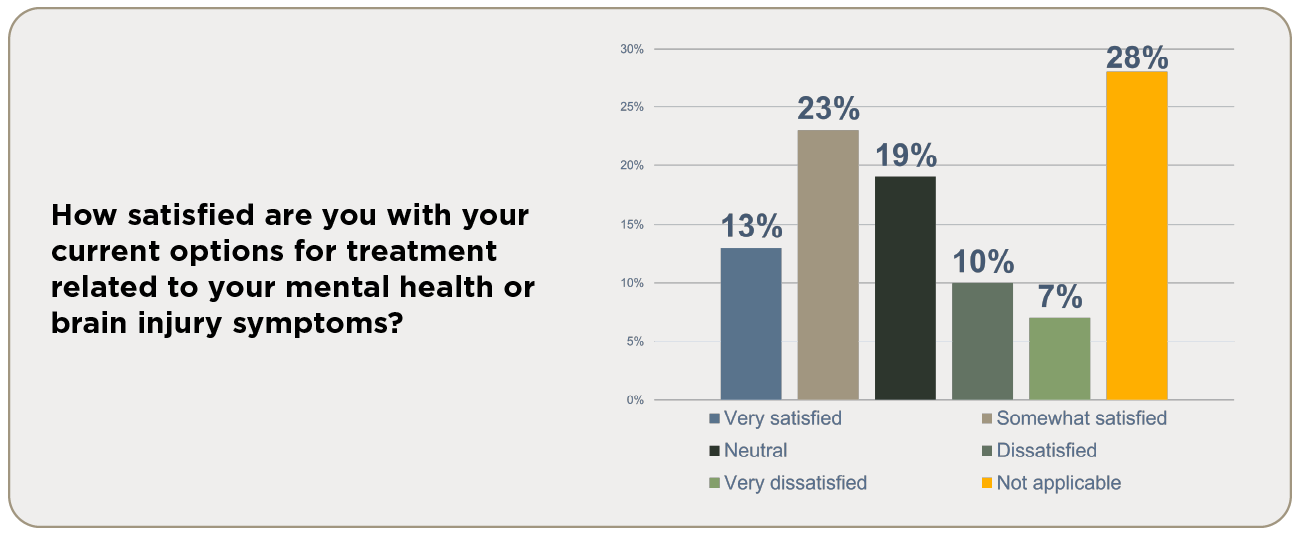Innovative Treatments are Making Strides to Support Veterans. The System Should Be, Too.

Earlier this year, Mission Roll Call asked veterans which treatments and services they believe the VA should offer. The answers weren’t ambiguous. Veterans expressed broad support not just for traditional services, but for a range of emerging and at times controversial options—from medical marijuana and psychedelics to hyperbaric oxygen therapy (HBOT), and abortion under certain conditions.
More than half of veterans surveyed said they supported the VA providing access to medical marijuana. Nearly the same number supported the use of psychedelic therapies like MDMA and psilocybin. Even abortion, a politically fraught subject, drew support when presented in the context of VA care. These results demonstrate that veterans are open to and seeking innovative care solutions and asking for a system willing to do the same.
That survey helped reframe the conversation in Congress and in the VA. It challenged assumptions that the veteran population would reflexively oppose novel or nontraditional treatments. It showed that today’s veterans are practical, open-minded, and focused on results. They want veterans taken care of in a way that meets the veteran’s needs and they want a VA that is equipped and authorized to deliver it.
This brings us to HBOT.
Veterans Want Better Options, Delivered Faster
Hyperbaric Oxygen Therapy (HBOT) is a promising new therapy treatment that a growing number of veterans are using to help treat Post Traumatic Stress and Traumatic Brain Injury.
We asked veterans whether they would support the Department of Veterans Affairs piloting HBOT to evaluate its effectiveness for treating traumatic brain injury and post-traumatic stress. Eighty-five percent said yes. Among those, over seventy percent said they strongly support a pilot program.
Veterans are not a group resistant to progress. In fact, even among those who said they had never heard of HBOT prior to the survey—nearly 42 percent of respondents—support for trying something new remained high. When asked if they would personally consider HBOT if it were available through the VA, more than seventy percent said either yes or that they might, given more information.
That level of support, despite limited familiarity, reflects a wider truth: veterans are not clinging to old models. They are open to innovation. What they are not interested in is delay.
The Current Model Isn’t Moving Fast Enough to Keep Up, and It Isn’t Enough
Of course, many veterans continue to rely on traditional mental health care models. Some of those experiences are positive. But for a meaningful portion of the population, the current system is not meeting the mark.
Only 12.6 percent of survey respondents said they are very satisfied with their available treatment options for mental health or brain injury. Over 17 percent reported some level of dissatisfaction. Another 28 percent said the options offered do not apply to their needs at all.
Those numbers do not indict the system, but they do clarify its limits. There are good clinicians inside the VA and given the sheer size of the veteran population receiving care from the VA, the VA does an admirable job of meeting a great deal of their needs. There are programs that work. But there are also gaps—and those gaps are not theoretical.
Veterans are not asking for the impossible. They are asking for a care model that accounts for the complexity of their experience. That model must include both the conventional and the emerging, with an emphasis on treating the whole person rather than just managing a condition.
Leadership Requires More Than Management
The VA has an opportunity here. So does Congress. For that matter, so do the VSO’s looking out for veterans. The opening is not to defend past choices or to slow-walk reform through years of committee review. It is to lead.
If the VA can take the initiative in deploying limited, well-structured pilot programs for HBOT or similar therapies, it can set the standard for how large systems adapt to the evolving science of trauma and recovery. Congress, for its part, can provide the legislative and fiscal support needed to make that transition possible. This is not about policy experimentation for the sake of headlines. It is about evaluating options that veterans are already asking for with rigor, transparency, and urgency.
There are precedents. HBOT is not new. It is used in hospitals across the country to treat diabetic wounds, carbon monoxide poisoning, and other physical injuries. It has also shown promise in helping patients with neurological symptoms related to traumatic brain injury. A 2017 study published in the National Institutes of Health database found cognitive and quality-of-life improvements among TBI patients who completed HBOT treatment (source). Similarly, research on MDMA-assisted therapy for PTSD has advanced to the final stage of FDA trials, with one major study finding that 67 percent of patients no longer met the criteria for PTSD after completing treatment (source).
What has been missing is not evidence of promise but willingness at the system level to formally test these tools in the veteran population and track outcomes in a way that can inform policy and practice.
What Veterans Are Telling Us Is A Simple Call to Action
Veterans are asking for options. They are not asking the VA to abandon its mission. They are asking it to modernize its model and to speed up the adoption process for novel care options.
Nor are they asking Congress to reinvent the wheel. They are asking it to provide the authority and support necessary for forward motion.
That bias for action we all learned as service-members? That’s what veterans are asking for from leadership.
By Mike Desmond | Strategic Director of Government Affairs and Advocacy, Mission Roll Call



